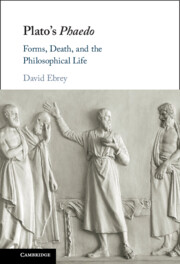Book contents
- Plato’s Phaedo
- Plato’s Phaedo
- Copyright page
- Dedication
- Contents
- Acknowledgments
- Introduction
- 1 The Characters
- 2 The Phaedo as an Alternative to Tragedy and Socrates as a Poet
- 3 Defense of the Desire to Be Dead
- 4 Cebes’ Challenge and the Cyclical Argument
- 5 The Recollecting Argument
- 6 The Kinship Argument
- 7 The Return to the Defense
- 8 Misology and the Soul as a harmonia
- 9 Socrates’ Autobiography
- 10 Cebes’ Objection and the Final Argument
- 11 The Cosmos and the Afterlife
- 12 The Death Scene
- Bibliography
- Index Locorum
- Index
10 - Cebes’ Objection and the Final Argument
86e–88b, 102a–107b
Published online by Cambridge University Press: 02 February 2023
- Plato’s Phaedo
- Plato’s Phaedo
- Copyright page
- Dedication
- Contents
- Acknowledgments
- Introduction
- 1 The Characters
- 2 The Phaedo as an Alternative to Tragedy and Socrates as a Poet
- 3 Defense of the Desire to Be Dead
- 4 Cebes’ Challenge and the Cyclical Argument
- 5 The Recollecting Argument
- 6 The Kinship Argument
- 7 The Return to the Defense
- 8 Misology and the Soul as a harmonia
- 9 Socrates’ Autobiography
- 10 Cebes’ Objection and the Final Argument
- 11 The Cosmos and the Afterlife
- 12 The Death Scene
- Bibliography
- Index Locorum
- Index
Summary
Cebes’ cloakmaker objection presents an alternative model of the soul according to which it is ultimately destroyed in the process of providing life to the body. Socrates’ final argument rejects this model by arguing that the soul’s bringing life to the body, far from destroying the soul, is precisely what ensures that it must be immortal and imperishable. In doing so, the argument identifies a way in which the soul has a characteristic of the divine – immortality – thereby specifying one way in which it is akin to the divine, as Socrates claimed in the kinship argument. Thus, the final argument responds to Cebes’ cloak maker objection in a way that further fills in the kinship argument’s account of the soul. The final argument also includes an important discussion of forms and ordinary objects. I argue that Socrates here identifies the most basic reason why forms cannot be ordinary, perceptible things: ordinary objects are receptive of opposites, whereas forms cannot be.
Keywords
- Type
- Chapter
- Information
- Plato's PhaedoForms, Death, and the Philosophical Life, pp. 248 - 274Publisher: Cambridge University PressPrint publication year: 2023

